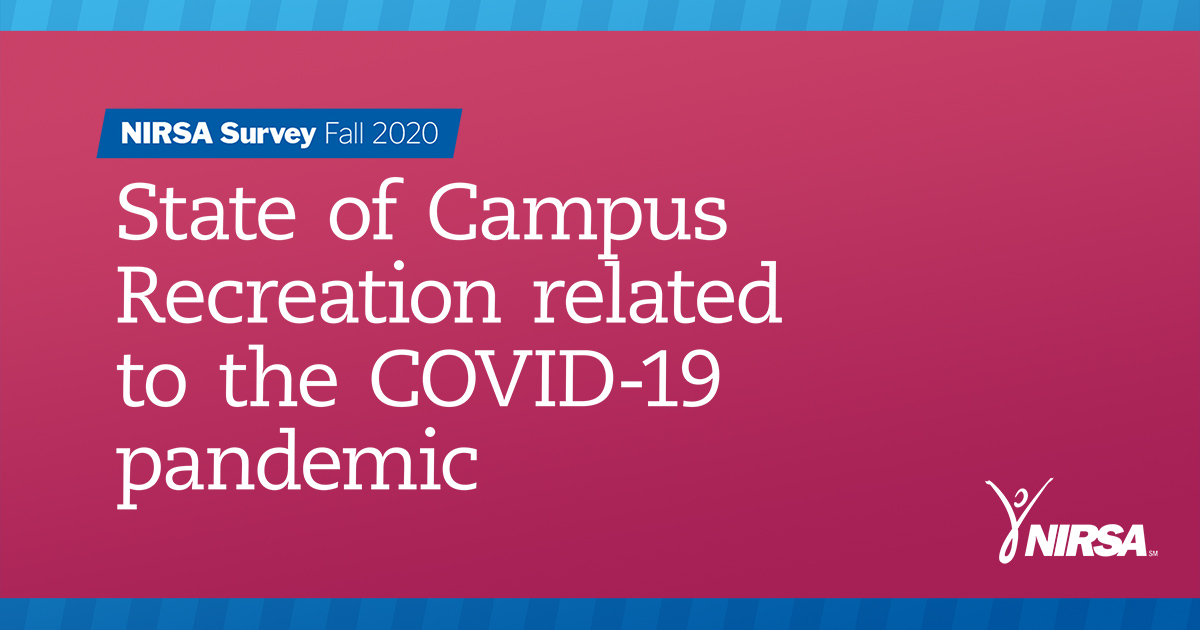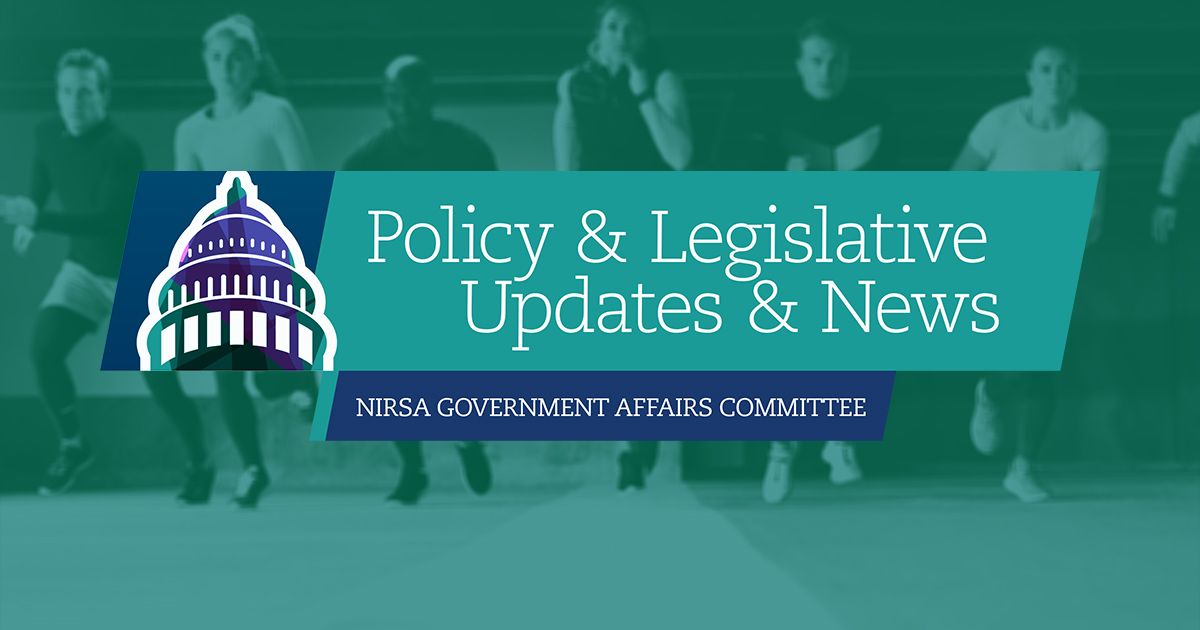NIRSA represents the field of collegiate recreation. Ours is a profession that has been active for more than 100 years, and organized by an association which was founded in 1950 by 20 Intramural Directors from 11 Historically Black Colleges and Universities.
Through the years, NIRSA members have grown the association and the field of collegiate recreation through generous sharing of knowledge, resources, ideas, and innovations. Our proclivity to share is often remarked on by outsiders who don’t enjoy a similar culture in their own profession, and what those who transition out of the field miss most, right behind working with students.
It is that same spirit of sharing that saw campus recreation professionals through one of the most tumultuous and challenging years in modern history. Early in the pandemic, members quickly came together to share through Ideas in Motion and in smaller peer groups. Networking opportunities exploded from a few times a year to weekly. NIRSA produced two pulse surveys last spring so all collegiate recreation professionals could know the types of pivots and decisions that were being made in recreation departments across North America.
Over the summer, racism, police brutality and deeply embedded inequities in the economy, education and health care once again gained attention and rightfully demanded recognition, reckoning, and redress. NIRSA members responded by engaging with one another for education, support, and even calling out where this association and our profession can and should know better and do better.
At the turn of the year, NIRSA again surveyed members, this time more extensively to learn what occurred over the fall 2020 term regarding campus recreation programming, staffing, and revenue in relation to the COVID-19 pandemic. The survey also asked participants about their sense of the future. The goal of these efforts is to fulfill members’ ongoing need to get a sense of what is happening in the broader landscape of the profession, beyond one’s own campus community or peer group.
Looking back
It is no surprise that the results demonstrate success amid new and often severe constraints. Among the 240 survey respondents, the majority of recreation centers were able to open (90%) and stay open (75%) throughout the fall, with 40% designated as “core” or “essential” to the university. Less than 2% reported COVID-19 cases linked to recreation center usage and 98% reported that students and other patrons generally followed the rules put in place for health and safety.
Recreation professionals are known as cross-campus collaborators and responses from the survey underscore how collaborative members have been during the pandemic. In fall term, collaborations with other departments were frequent and spanned a variety of areas. Student programming (69%), COVID testing or tracing (46%), risk mitigation planning (54%), and communication planning (56%) topped the list of areas for cross campus collaborations. Campus recreation has also been generous with resource sharing; 25% reported temporarily reallocating staff to other units.
Recreation professionals are flexible and responsive; those skills were leveraged as staff teams quickly moved to remote work scenarios, online programming, and increasing virtual engagement efforts. Some of the new programs are expected to stay, including virtual programming (89%), esports leagues/competitions (55%), virtual staff training (64%), and expanded reservation systems (38%). Flexible or remote work schedules for professional staff are expected to continue at 65% of the responding institutions.
Looking forward
Campus communities are feeling the pull from students and administrators to return to a full campus experience – the living, learning, and social communities that physically being present on campus offers. However, hybrid is here to stay.
Yes, typical users who were coming to the recreation center before the pandemic will likely return, looking for the same programs and opportunities they’ve previously enjoyed. But—with nearly a year of forced experimentation under our belts and a shift in how society is willing or expects to engage—campus recreation has an opportunity to expand its impact on student success.
Perhaps these new online or hybrid methods will help us to engage that last segment of students we weren’t reaching before; the opportunity is there for us to engage more of the faculty/staff, surrounding communities, or extended alumni networks. Our expanding skills in digital engagement and fostering online communities may be new and effective ways to advance cultures of wellbeing and collaborate with our colleagues across higher education.
Our aspirations to come through this pandemic and build a new normal that is better for all stakeholders does not ignore or downplay the significant challenges we face over the near term. When asked when departmental operations and programs would return to a “new normal,” only 17% were optimistic it would occur by spring 2021. But, projecting out a little further, 61% expressed optimism for fall 2021, and 80% were optimistic for a return to a new normal by spring 2022. These responses reflect a cautious optimism that is simultaneously grounded in reality and confident for our future. Jim Collins, author of Good to Great, reminds us of the Stockdale Paradox: “you must retain faith that you will prevail in the end AND you must also confront the most brutal facts of your current reality.” Recreation professionals are living that paradox as they look to the future.
NIRSA is at its core a learning and sharing organization. As higher education and campus recreation professionals navigate through a global pandemic, economic and health disparities, and a reckoning for systemic racism, NIRSA will continue to serve as the backbone for connection, sharing, learning, and growing. Through NIRSA’s broad network of professionals we can co-create new solutions, accelerate positive change, and broadcast new ideas.
Thank you to the 240 NIRSA institutions who responded to the survey. Your generous sharing of time and perspective will undoubtably help others to learn, adapt, and advocate on their own campuses. NIRSA will continue to deliver meaningful resources to association members and source data that supports the value of campus recreation.
About NIRSA
NIRSA: Leaders in Collegiate Recreation is the professional association for recreation and wellbeing on college campuses. Through the platform of inclusive recreation, NIRSA members impact more than 10 million students each year for the purpose of helping them to develop healthy habits for life.
The association provides a framework for lifelong, competency-based professional development and inspires purposeful acquisition of new skills. As leading voices in the integrated wellbeing movement on colleges and universities across North America, NIRSA members are committed to supporting foundational, proactive, and upstream-based wellbeing initiatives for the campus community above and beyond reactive, siloed, programmatic approaches to health.
Participating institutions
- Abilene Christian University
- Adelphi University
- American University
- Appalachian State University
- Arkansas Northeastern College
- Augusta University
- Austin Peay State University
- Bemidji State University
- Berkshire Community College
- Binghamton University
- Bradley University
- Brandeis University
- Brigham Young University – Idaho
- Bryant University
- Butler University
- Cabrini University
- California State University Bakersfield
- California State University, Fullerton
- Carnegie Mellon University
- Carroll University (Wisconsin)
- Carson-Newman University
- Catholic University
- CENTERS, LLC at the University of Alabama at Birmingham
- Central Washington University
- chapman university
- Claflin University
- Cleveland State University
- Coastal Carolina University
- College of Charleston
- College of William & Mary
- Colorado Mesa University
- Colorado State University
- Colorado State University Pueblo
- Columbia Basin College
- Columbia University
- Cornell University
- Creighton University
- DePaul University
- Drake University
- East Tennessee State University
- Eastern Illinois University
- Eastern Kentucky University
- Eastern Washington University
- Elizabethtown College
- Elon University
- Embry Riddle Aeronautical University -Daytona Beach
- Emory University
- Emporia State University
- Fairfield University
- Fairmont State University
- Florida Gulf Coast University
- Fort Lewis College
- George Fox University
- George Mason University
- Georgia State University
- Gonzaga University
- Grand Valley State University
- Harvard University
- Hinds Community College
- Humboldt State University
- Indiana State University
- Indiana University Purdue University Indianapolis
- Iowa Western Community College
- John Carroll University
- Keene State College
- Kennesaw State University
- Kent State University
- Lafayette College
- Lehigh University
- Lincoln University of MO
- Logan University
- Loma Linda University
- Longwood University
- Louisiana State University
- Marquette University
- Miami University
- Michigan State University
- Middle Tennessee State University
- Minot State University
- MIT
- Montclair State University
- MSU Denver
- Muskingum University
- NC State University
- Neumann University
- Nevada
- Niagara University
- North Dakota State University
- Northeastern University
- Northern Arizona University
- Northern Kentucky University
- Northern Michigan University
- Nova Southeastern University
- Oakland University
- Odessa College
- Okinawa Institute of Science and Technology
- Olympic College
- Oregon State University
- Penn State Altoona
- Pennsylvania College of Technology
- Phillips Community College of University of Arkansas
- Portland State University
- Princeton University
- Providence College
- Queen’s University at Kingston
- Rensselaer Polytechnic Institute
- Robert Morris University
- Rowan University
- Saint Joseph’s University
- Saint Louis University
- Sam Houston State University
- Samford University
- San Diego State University
- San Francisco State University
- San Jose State University
- Santa Clara University
- Schoolcraft College
- Seneca College
- Seton Hall University
- South Dakota State University
- Southern Illinois University Edwardsville
- Southern Methodist University
- Southwestern University
- St Cloud State University
- Stanford
- Stephen F. Austin State University
- Stetson University
- Stevenson University
- SUNY Brockport
- SUNY Oswego
- Temple University
- Texas A&M Corpus Christi
- Texas A&M University at Galveston
- Texas A&M University-College Station
- Texas A&M University-Commerce
- Texas A&M University-Kingsville
- Texas Lutheran University
- Texas Southern University
- Texas State University
- The College of New Jersey
- The George Washington University
- The University of Minnesota Twin Cities
- The University of New Mexico
- The University of Southern Mississippi
- The University of Texas at Austin
- The University of Texas at San Antonio
- The University of Texas Rio Grande Valley
- The University of Toledo
- Towson University
- Tulane University
- UC Berkeley
- UNC Wilmington
- University of Alabama
- University of Arizona
- University of Calgary
- University of California Santa Barbara
- University of California, Los Angeles
- University of California, Merced
- University of Central Florida
- University of Cincinnati
- University of Colorado Colorado Springs
- University of Denver
- University of Florida
- University of Georgia
- University of Hawaii Hilo
- University of Health Sciences & Pharmacy (formerly St. Louis College of Pharmacy)
- University of Houston
- University of Houston Clear Lake
- University of Illinois Chicago
- University of Illinois Springfield
- University of Illinois Urbana Champaign
- University of Iowa
- University of Kansas
- University of Kentucky
- University of Louisiana at Lafayette
- University of Louisville
- University Of Maine
- University of Maine at Farmington
- University of Maryland, Baltimore
- University of Maryland, Baltimore County
- University of Maryland, College Park
- University of Massachusetts Amherst
- University of Miami
- University of Michigan
- University of Michigan-Flint
- University of Mississippi
- University of Missouri – St. Louis
- University of Nebraska
- University of New Brunswick
- University of New Hampshire
- University of New Haven
- University of New Mexico – Gallup
- University of North Carolina at Charlotte
- University of North Dakota
- University of North Texas
- University of Northern Iowa
- University of Oregon
- University of Pennsylvania
- University of Regina
- University of Richmond
- University of San Diego
- University of South Alabama
- University of South Carolina
- University of South Carolina Aiken
- University of South Carolina Upstate
- University of South Dakota
- University of South Florida
- University of St. Thomas – Houston
- University of Tampa
- University of Tennessee
- University of Tennessee Health Science Center
- University of Texas Southwestern Medical Center
- University of the Pacific
- University of Utah
- University of Vermont
- University of Victoria
- University of Virginia
- University of Washington, Seattle campus
- University of West Florida
- University of Wisconsin – Green Bay
- University of Wisconsin – Whitewater
- University of Wisconsin Oshkosh
- University of Wisconsin River Falls
- University of WI-Superior
- Utah State University
- Utah Valley University
- Villanova University
- Vincennes University
- Virginia Commonwealth University
- Virginia Tech
- Viterbo University
- Wake Forest University
- Washburn University
- Washington State University
- Western Kentucky University
- Western Michigan University
- Western Oregon University
- Western University
- Westminster College
- Worcester State University
- For more information, visit nirsa.org. Press inquiries can be directed to NIRSA Communications Director Simon Bravo.
Pam Watts is Executive Director of NIRSA: Leaders in Collegiate Recreation, headquartered in Corvallis, Oregon. Pam is a Certified Association Executive and she can be reached at Pam.Watts@nirsa.org








